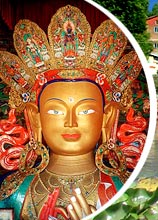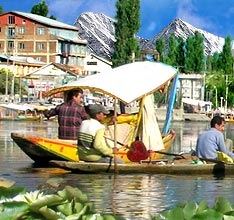 The
Lamayuru Monastery of Ladakh is situated at a distance of approximately
127 km to the west of Leh. The legend associated with this monastery
goes that at the time of Sakyamuni (the Historical Buddha), nags (holy
serpents) used to live in a Lake at the present day Lamayuru's valley.
It was the prediction of the Bodhisattva Madhyantaka that the lake would
get drained out, making the place for the construction of a monastery.
It is further believed that in 11th century, Mahasiddhacharya Naropa,
Indian Buddhist scholar, meditated for many years in a cave in Dukhang,
still seen today.
The
Lamayuru Monastery of Ladakh is situated at a distance of approximately
127 km to the west of Leh. The legend associated with this monastery
goes that at the time of Sakyamuni (the Historical Buddha), nags (holy
serpents) used to live in a Lake at the present day Lamayuru's valley.
It was the prediction of the Bodhisattva Madhyantaka that the lake would
get drained out, making the place for the construction of a monastery.
It is further believed that in 11th century, Mahasiddhacharya Naropa,
Indian Buddhist scholar, meditated for many years in a cave in Dukhang,
still seen today.Naropa, by causing a split in the surrounding hillside, led to the draining of the lake. In the emptied lake, he found a dead lion and on the same spot, he built the first temple, the Singhe Ghang (Lion Mound). Some other legends have it that in the 10th century, the King of Ladakh instructed that the building of Lamayuru be constructed under the supervision of Rinchen Zangbo. Initially, the Lamayuru Monastery at Ladakh comprised of five buildings. However, today, only the central one exists.
Lamayuru Gompa of Leh Ladakh, belonging to the Red-Hat sect of Buddhism, serves as the residence of approximately 150 monks. Also, it boasts of a number of shrines, thangkas and some superb wall paintings. One of the major attractions of the Gompa consists of the two masked dances that take place every year. The monks from the surrounding areas gather at Lamayuru for these dances in the 2nd and 5th month of Tibetan lunar calendar, to pray as well as take part.









